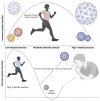A Guide to Different Intensities of Exercise, Vaccination, and Sports Nutrition in the Course of Preparing Elite Athletes for the Management of Upper Respiratory Infections during the COVID-19 Pandemic: A Narrative Review
- PMID: 35162910
- PMCID: PMC8835175
- DOI: 10.3390/ijerph19031888
A Guide to Different Intensities of Exercise, Vaccination, and Sports Nutrition in the Course of Preparing Elite Athletes for the Management of Upper Respiratory Infections during the COVID-19 Pandemic: A Narrative Review
Abstract
Elite athletes use high-intensity training to maintain their fitness level. However, intense training can harm the immune system, making athletes suspectable to COVID-19 and negatively affecting their performance. In addition, the diet of athletes should be appreciated more as it is another influencer of the immune system, especially during the COVID 19 pandemic. The other important issue elite athletes face currently is vaccination and its possible intervention with their training. The present study attempts to discuss the impact of different training intensities, nutritional strategies, and vaccination on the immune system function in elite athletes. To this end, Scopus, ISC, PubMed, Web of Science, and Google Scholar databases were searched from 1988 to 2021 using the related keywords. The results of our review showed that although high-intensity exercise can suppress the immune system, elite athletes should not stop training in the time of infection but use low- and moderate-intensity training. Moderate-intensity exercise can improve immune function and maintain physical fitness. In addition, it is also better for athletes not to undertake high-intensity training at the time of vaccination, but instead perform moderate to low-intensity training. Furthermore, nutritional strategies can be employed to improve immune function during high-intensity training periods.
Keywords: COVID-19; athlete’s immune system; performance; training intensity.
Conflict of interest statement
The authors declare that the research was conducted without any commercial or financial relationships that could be construed as a potential conflict of interest.
Figures
Similar articles
-
Successful Reboot of High-Performance Sporting Activities by Japanese National Women's Handball Team in Tokyo, 2020 during the COVID-19 Pandemic: An Initiative Using the Japan Sports-Cyber Physical System (JS-CPS) of the Sports Research Innovation Project (SRIP).Int J Environ Res Public Health. 2021 Sep 18;18(18):9865. doi: 10.3390/ijerph18189865. Int J Environ Res Public Health. 2021. PMID: 34574789 Free PMC article.
-
Elite athletes maintain peak performance after testing positive for SARS-CoV-2.J Sci Med Sport. 2022 Feb;25(2):195-196. doi: 10.1016/j.jsams.2021.08.010. Epub 2021 Sep 20. J Sci Med Sport. 2022. PMID: 35042610 Free PMC article.
-
Prevalence and Risk Factors of Psychiatric Symptoms among Swiss Elite Athletes during the First Lockdown of the COVID-19 Pandemic.Int J Environ Res Public Health. 2021 Oct 14;18(20):10780. doi: 10.3390/ijerph182010780. Int J Environ Res Public Health. 2021. PMID: 34682521 Free PMC article.
-
The effects of acute respiratory illness on exercise and sports performance outcomes in athletes - A systematic review by a subgroup of the IOC consensus group on "Acute respiratory illness in the athlete".Eur J Sport Sci. 2023 Jul;23(7):1356-1374. doi: 10.1080/17461391.2022.2089914. Epub 2022 Jul 8. Eur J Sport Sci. 2023. PMID: 35695464
-
Immune nutrition and exercise: Narrative review and practical recommendations.Eur J Sport Sci. 2019 Feb;19(1):49-61. doi: 10.1080/17461391.2018.1490458. Epub 2018 Jul 5. Eur J Sport Sci. 2019. PMID: 29975589 Review.
Cited by
-
Supplementation of L-glutamine enhanced mucosal immunity and improved hormonal status of combat-sport athletes.J Int Soc Sports Nutr. 2024 Dec;21(1):2300259. doi: 10.1080/15502783.2023.2300259. Epub 2024 Jan 9. J Int Soc Sports Nutr. 2024. PMID: 38193521 Free PMC article. Clinical Trial.
-
Professional Athletes Maintain High TNF-Alpha or IFN-Gamma Related Inflammatory Status after Recovering from COVID-19 Infection without Developing a Neutralizing Antibody Response.Sports (Basel). 2023 Apr 30;11(5):97. doi: 10.3390/sports11050097. Sports (Basel). 2023. PMID: 37234053 Free PMC article.
-
Highlighting the novel effects of high-intensity interval training on some histopathological and molecular indices in the heart of type 2 diabetic rats.Front Endocrinol (Lausanne). 2023 May 19;14:1175585. doi: 10.3389/fendo.2023.1175585. eCollection 2023. Front Endocrinol (Lausanne). 2023. PMID: 37274326 Free PMC article.
-
Impact of COVID-19 Vaccination on Short-Term Perceived Change in Physical Performance among Elite Athletes: An International Survey.Vaccines (Basel). 2023 Apr 4;11(4):796. doi: 10.3390/vaccines11040796. Vaccines (Basel). 2023. PMID: 37112708 Free PMC article.
-
Highlighting the idea of exerkines in the management of cancer patients with cachexia: novel insights and a critical review.BMC Cancer. 2023 Sep 20;23(1):889. doi: 10.1186/s12885-023-11391-3. BMC Cancer. 2023. PMID: 37730552 Free PMC article. Review.
References
-
- Antrobus M., Cuttell S., Machado L.R. Epigenetics of Exercise and Sports. Elsevier; Amsterdam, The Netherlands: 2021. Epigenetics, Exercise, and the Immune System; pp. 183–199.
Publication types
MeSH terms
LinkOut - more resources
Full Text Sources
Medical



